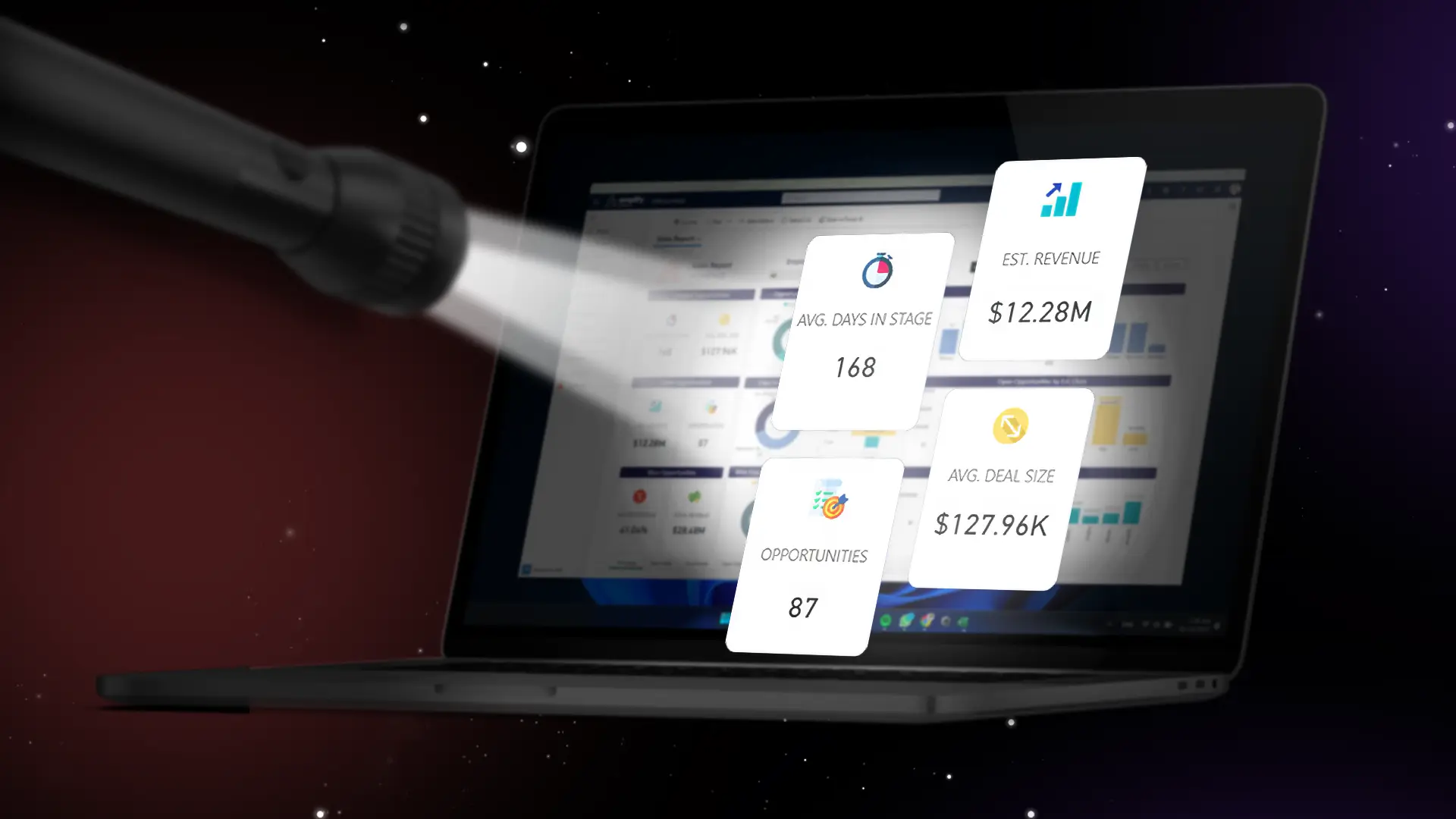If you recall our recent exploration into the transformational journey from traditional sales to CRM empowerment, you begin to realize the stark reality that emerges for companies still shrouded in the shadows of outdated systems.
But the absence of a modern sales system doesn't just dim the lights on potential opportunities—it plunges prospect data, and sales, into darkness.
The Pitfalls of Traditional Sales Without CRM
A sales journey without the steady guidance of a CRM system can lead even the most seasoned sales teams into a maze of inefficiencies. Traditional sales methods, while steeped in the personal touch of the good old days, often fail to leverage data, leaving a trail of missed opportunities.
- Reliance on Scattered Information: Sales reps find themselves sifting through a morass of emails, notes, and disconnected spreadsheets. This disjointed approach not only slows down the sales process but also increases the risk of overlooking key customer interactions and insights.
- Limited Access to Historical Data: With no centralized repository for customer information, sales teams struggle to build upon past interactions. Each client interaction becomes a standalone event devoid of context, making it challenging to nurture leads and build on previous successes.
- Inability to Accurately Forecast: Devoid of data aggregation and analysis, sales forecasts are often no more than educated guesses. This lack of precision in forecasting can skew resource allocation and stifle strategic planning, directly impacting the bottom line.
- No Real-time Insights: Real-time adjustments are crucial in the dynamic B2B sales environment. Without CRM, sales teams are deprived of the instant insights needed to pivot strategies and respond to market changes effectively.
- Fragmented Customer Experience: The traditional sales model tends to silo customer information by rep, leading to a fragmented customer experience. The absence of a unified view means businesses cannot deliver the cohesive and personalized experiences that today's clients expect.
While traditional sales methods have their merits, they are increasingly incompatible with the demands of modern business. A CRM gives sales teams, not just individuals, the ability to connect, understand, and grow with their clients.
Critical Sales Metrics You're Missing
Are your essential sales metrics hidden in the shadows? The absence of CRM means vital sales indicators remain invisible, untracked, and underutilized, restricting a business's capacity to thrive in a data-driven market.
- Lead Conversion Rates: Without a CRM, tracking the journey of leads from prospect to customer can be elusive, making it difficult to measure and improve conversion rates.
- Customer Engagement Levels: Sales teams lack visibility into engagement metrics, leaving them unaware of how often and how effectively they interact with potential clients.
- Sales Cycle Lengths: The duration of sales cycles often goes unmonitored, obscuring the understanding of time-to-close and the effectiveness of sales tactics.
- Revenue Attribution: Determining which sales activities and channels generate revenue becomes guesswork, preventing sales teams from capitalizing on successful strategies.
- Customer Lifetime Value (CLV): Without CRM, calculating the CLV is complex and imprecise, leading to suboptimal customer relationship management and missed opportunities for upselling and cross-selling.
Navigating Sales in the Dark
Navigating sales without a CRM is like sailing a ship without a compass; sales teams operate on intuition rather than insight, with consequences that often lead to lost revenue and missed opportunities.
Here's what happens to your sales team when they don't have access to a compass:
- Reliance on Gut Feelings: Sales reps must trust their instincts over data, making decisions that lack the backing of solid analytics.
- Missed Follow-up Opportunities: With no system to track interactions, potential deals can slip through the cracks due to forgotten follow-ups and overlooked communications.
- Inconsistent Customer Experience: The absence of a unified customer view leads to a disjointed experience, as different team members lack access to the full history of customer interactions.
- Difficulty in Scaling Sales Efforts: As the business grows, the informal systems of traditional sales become unsustainable, leading to inefficiencies and a plateau in sales growth.
- Lack of Collaboration: Without a shared platform, sales teams struggle to work cohesively, resulting in duplicated efforts and a lack of synergy.
- Reactive Rather Than Proactive Sales: Sales teams are constantly playing catch-up, reacting to customer situations as they arise instead of anticipating needs and trends to stay ahead of the curve.
The Domino Effect on Customer Relationships
Operating without a CRM doesn't just affect sales metrics and internal processes; it has a profound impact on the customer relationships that are the sales lifeline. Here's how the absence of CRM can lead to adverse effects on customer engagement and loyalty.
- Inconsistent Customer Interactions: Without a CRM, there's no centralized history of customer interactions, leading to inconsistent and sometimes contradictory communications that can frustrate customers.
- Poorly Timed Engagements: The lack of visibility into customer needs and previous touchpoints can result in poorly timed sales pitches or follow-ups, potentially alienating customers.
- Lost Customer Insights: Valuable customer feedback and preferences can fall through the cracks without a CRM, leading to generic sales strategies that fail to resonate with individual customer needs.
- Degraded Customer Trust: When customer details and previous issues are not tracked or remembered, trust erodes as customers feel undervalued and unseen.
- Challenges in Personalization: CRM systems excel at providing the data needed for personalization. Without this tool, sales efforts lack the personal touch that can differentiate a company in a crowded market.
- Inefficient Resolution of Issues: Solving customer problems becomes a game of guesswork without a CRM's centralized issue tracking, leading to longer resolution times and increased customer dissatisfaction.
Data-Driven Sales: The Illuminated Path
The shift to a data-driven sales approach, enabled by a CRM system, is like flipping on the lights in a pitch-dark room.
- Illuminating the Sales Process: With a CRM, sales teams can clearly see the entire sales cycle, from initial contact to post-sale follow-up, allowing for strategic engagements and efficient progression through the sales funnel.
- Real-Time Metrics at Your Fingertips: A CRM provides instant access to real-time data, enabling sales managers and teams to make informed decisions quickly and pivot strategies as needed.
- Personalization at Scale: Armed with customer data, sales teams can tailor their approach to each prospect, delivering personalized communications that significantly increase the chances of conversion.
- Forecasting with Confidence: The predictive power of CRM analytics allows for accurate forecasting, helping sales teams to set realistic targets and management to plan for future growth effectively.
- Enhanced Customer Experience: By harnessing the insights provided by a CRM, sales teams can not only meet but exceed customer expectations, fostering loyalty and encouraging repeat business.
- Strategic Customer Engagement: Data from a CRM system helps sales teams to identify the most opportune moments for engagement, ensuring that every interaction adds value to the customer relationship.
Steps to Bringing Your Sales Data into the Light
How you'll transition from traditional sales methods to a data-enlightened approach requires deliberate steps. Here are some actionable steps you can take to illuminate your sales data:
Step 1 - Conduct a Data Audit: Begin by assessing current data collection methods and identifying what data is being captured, what's missing, and what can be improved.
Step 2 - Choose the Right CRM Platform: Select a CRM that aligns with your business size, needs, and sales processes. Consider factors like scalability, automation and integration capabilities, and user-friendliness.
Step 3 - CRM Implementation and Customization: Implement the CRM platform and customize it to fit your sales cycle, ensuring it captures all the necessary data points and reflects your sales funnel accurately.
Step 4 - Data Migration and Integration: Migrate existing data into the new system and integrate it with other tools and platforms used by your company to ensure a single source of truth.
Step 5 - Training and Adoption: Invest in comprehensive training for your sales team to ensure they understand how to use the CRM effectively and make the most of the data available.
Step 6 - Set Up Dashboards and Reports: Create customized dashboards and reports that provide insights into key sales metrics and performance indicators for different roles within the sales team.
Step 7 - Monitor and Refine: Regularly review CRM data and the insights generated to refine sales strategies, improve processes, and enhance customer engagement tactics.
Step 8 - Encourage a Culture of Data Utilization: Foster a workplace culture where data-driven decision-making is valued and encouraged, making CRM data a cornerstone of all sales-related activities.
Illuminate Your Sales Strategy Today
Are you ready to turn the lights on your sales data? To explore the full spectrum of insights that a robust CRM system can offer?
If the answer is yes, then it's time to take decisive action.
🔥 Join the Revolution - Don't let another deal slip through the cracks because of outdated methods. Click the link below to schedule a personalized demo of our CRM platform and see firsthand how it can transform your sales process.
💡 Empower Your Team - Share this article with your sales team and decision-makers. Open the dialogue on how CRM can be the beacon to guide your sales strategy toward uncharted success.
📈 Take the Survey - Still unsure? Take our quick survey to find out if you’re ready to identify, address, and overcome your CRM adoption barriers.
Your sales data is waiting to be discovered and leveraged. Let's illuminate your path to brighter, more prosperous sales. Book a personalized demo.
Lighting the Way Forward with CRM
Integrating a CRM system is not just an upgrade to your sales arsenal; it's a fundamental shift towards a future where every sales decision is informed, every customer interaction is leveraged, and no opportunity is left hidden in the shadows of guesswork and intuition.
By stepping out of the dark and into the data-driven light, businesses can not only see their current standing more clearly but also forecast with greater accuracy, adapting to the market's ebbs and flows with the confidence that comes from real-time insights and analytics.
The transformation from traditional sales to CRM empowerment is not just about embracing new technology—it's about illuminating the path to sustained growth, stronger customer relationships, and a resilient, future-proof business model.
Remember that the journey to CRM enlightenment is continuous. It evolves with every new piece of data, every sales win, and every lesson learned along the way. It's a journey that promises not just better sales outcomes but a brighter future for the entire organization.
So, take the first step towards bringing your sales data into the light and watch your sales team transform.


